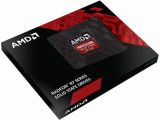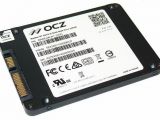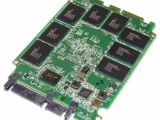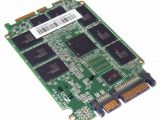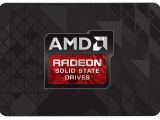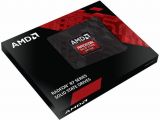For those new to this latest business move on AMD's part, the Sunnyvale, California-based company has introduced a series of SSDs bearing the Radeon R7 brand, like its mid-range graphics cards.
The drives were actually made by OCZ, from Toshiba 19nm MLC (multi-level cell) NAND Flash chips and OCZ's own Indilinx Barefoot controller chip. However, they use a new firmware from AMD that maximizes both performance and endurance.
The AMD Radeon R7 SSDs have capacities of 120 GB, 240 GB, and 480 GB, and performance of 550 MB/s read and 540 MB/s write, on paper. On that note, the 4K random performance is of 85,000 IOPS, 95,000 IOPS, and 100,000 IOPS, despite the existence of 256 Bit AES encryption.
We won't blame you if you're skeptical about those numbers, but reviews, at least those form HotHardware and Guru3D, have confirmed that while real world data rates may not quite reach those numbers, they come very close.
In fact, the tests concluded with the reviewers considering the AMD Radeon R7 Series SSDs one of the most balanced and well-performing SSDs on the market. We can understand the conclusion, what with the prices of $99.99 / €99.99 to $298.99 / €298.99.
You'll definitely want to at least consider them if you're thinking of buying, say, a Sandisk Extreme Pro, unless you want something with more capacity than 480 GB.
AMD has also revealed why it has entered the SSD market: it wished to provide a one-stop shop for enthusiasts looking to build a new, strong PC.
The idea is that prospective customers should be able to buy AMD-branded memory, processors, chipsets, graphics cards and storage devices all in one go, without having to look all over the place or wondering if this or that part will play well with the others.
It actually does make sense. AMD already makes CPUs/APUs and motherboard chipsets, and it launched Radeon-branded RAM a while ago. Storage units were really all that remained as far as the essential parts of a computer are concerned.
Now we just have to see if the company extends its reach to the less essential things, like PSUs, peripherals and cooling systems. Maybe we'll find out more at that big anniversary event that AMD has scheduled for this Saturday (August 23, 2014).
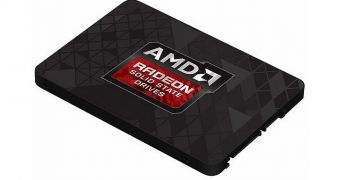
 14 DAY TRIAL //
14 DAY TRIAL // 
